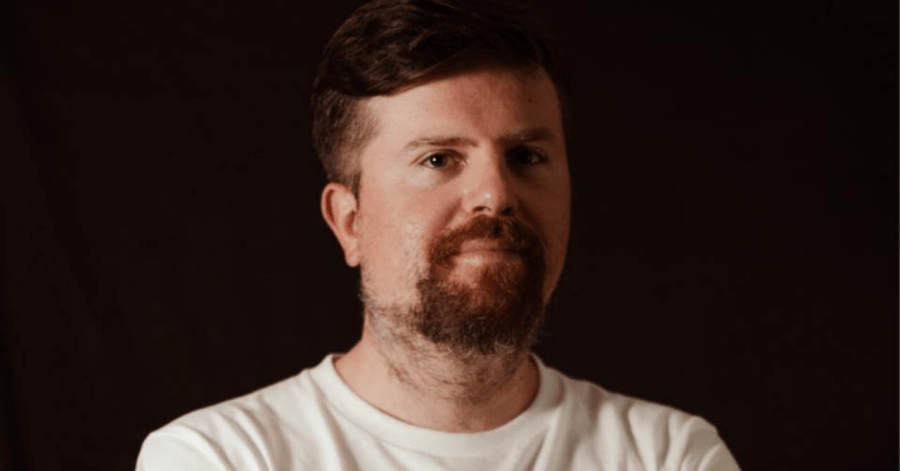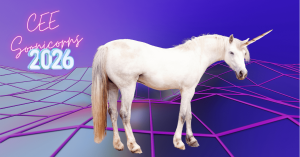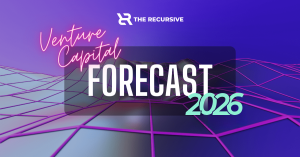Dimitris’ fascination with the tech innovation ecosystem began during his early work as a journalist, reporting from Greece. During this time, he found his own calling for entrepreneurship. This led to the creation of Found.ation in 2011, now a leading technology and innovation enabling platform in Southeast Europe. Later on, he put on the investor hat, as both angel investor and co-founder of Velocity.Partners VC fund for early-stage ventures – a move that he wishes he had done earlier.
His journey through the Greek innovation landscape reflects the growth of the ecosystem itself. Today, Found.ation runs a digital transformation accelerator for companies, acts as a tech education hive, and offers reskilling, upskilling, as well as consulting services. Meanwhile, Velocity.Partners has had 22 portfolio companies, many with international presence, and 3 exits.
As a deep believer in the potential of a united, collaborative tech startup ecosystem in the Balkans, Dimitris reached out to The Recursive at the beginning of 2022. The synergy quickly established, Dimitris is now one of our board members, and our first shareholder in Greece. There are few people who have dedicated so much of their mind space and resources to the Greek startup ecosystem.
In this interview, Dimitris Kalavros-Gousiou shares more about:
- What trends are shaping the Southeast European tech ecosystems;
- What sets Greek entrepreneurs apart, and what he looks for in a potential target;
- How we can benefit from accelerating regional cooperation between tech startup ecosystems in the Balkans.
The Recursive: Going back to the roots, what pushed you to launch Found.ation in 2011, and what did you set out to achieve?
Dimitris Kalavros-Gousiou: The year was 2011, so, if you can recall, it was the very beginning of the co-working wave. So, across the globe, we had the WeWorks and Tech Hubs and all these different co-working spaces forming.
Back then, the ecosystem was small, maybe around 100 people – 30-40 founders, 30-40 people surrounding them like mentors and early-stage angels, and three or four funds. And the idea behind our initiative was that it made sense to have a physical space where several projects can work together and benefit from peer knowledge and where people can meet on a periodical basis. There were some monthly events gathering the ecosystem but we wanted to have smaller initiatives, for 10-20 people, on a more regular and ongoing basis.
With that in mind, Found.ation, to me, always meant the foundational part of the ecosystem. A pillar of the ecosystem. So, this is how we started, even though this particular initiative (Ed.note the co-working space) never took off.
But we pivoted towards organizing accelerator programs. Back then, we were having the Greek crisis – many companies were trying to formulate initiatives to keep young people or help them repatriate. Banks, telecoms, energy companies, they were sponsoring these programs and we were running them. This was the most important business pillar we had for the first few years, up to 2016, when we introduced two more business lines, our upskilling and reskilling program offerings, and a digital transformation consulting arm.
What does Found.ation offer to founders and corporate professionals within these different pillars?
One of the business pillars Found.ation is focusing on right now is business upskilling and reskilling – which means that you have companies that are willing to invest in their people and provide a new curriculum that will make them a bit more modern in terms of business skills.
Found.ation works with companies by offering digital literacy courses to their employees. What sets us apart is that we focus on innovation-related skills, as well as emerging technologies – these, along with the startup-mindset, are the sectors we are mostly specialized in because of our unique DNA.
Then, within the digital transformation consulting arm we empower corporations to be able to form new products, optimize processes, formulate partnerships with startups, so that they can use, sell, or upsell the startups’ products.
With our acceleration program, we found out that the way we operated at Found.ation, and all this startup mentality we have developed, was quite interesting as a methodology for bigger companies as well. We thought that since we were already working with corporations and they sponsor startup acceleration programs, we can take this methodology and create internal processes, products, and initiatives for these companies. This is how we came up with the consulting arm of Found.ation.
What trends do you see shaping the Southeast European tech ecosystems in the years to come?
I believe that the Gen Z and Millennial economy will, to a great extent, form the next wave of startups, formulating, creating, and financing Web3 and the metaverse. I believe there will be a massive introduction of new products and services targeting these age groups.
Then there is enterprise software and SaaS. If you can tell – most of the success stories in this part of Europe come from the wider enterprise software space, from UiPath to Paywahk, and Viva Wallet. In Greece, 8 out of 10 of our biggest startup exits to date are B2B. And although I agree with those arguing that past performance is not a great indicator of the future, this is different. If we are really good at something, we should double down on it. When it comes to B2B SaaS, you see these local companies doing well on international markets, with global customers and competitors.
In 2018, you also launched a pre-seed and seed VC fund, Velocity.Partners. How did you decide to go into investing, and what is the fund’s thesis of investment?
Note: Velocity.Partners has concluded its investment period.
Going into investing was a natural evolution for me, after being around so many founders and so many different programs for five years. We needed to strengthen our position in the ecosystem. Essentially, Velocity.Partners was built out of Found.ation’s legacy and track record in the acceleration business. The main idea was that if we are to be part of this ecosystem, we cannot be part of it without the ability to deploy capital in the businesses in which we believe the most. So, it was also a natural step for our activity at Found.ation.
I think I enjoy working with founders that much because I am not really convinced I would be such a great operator. I provide more value when I am acting as an advisor.
What are the key three things that catch investors’ attention when assessing a potential target?
At pre-seed and seed stages, we have very few data points. When you have a company that generates revenue, you have a different angle and more data to examine.
So, at an early stage, I think it’s mostly the team and the market. If I had to pick three things …team, market, team. What I’m trying to say is that the absolute fundamental factor is the quality of the team. Whether they’re committed, fully engaged with the startup and don’t have any other side hustles. They need to bring on board expertise and skills that are worthy, and relevant for the market they are in.
Another thing I would look for in founders is whether they are coachable. Whether they are people with whom you can see further potential and willingness for personal and professional development. Eventually, you want to see a leader who can get the company to a certain stage. Nobody wants to see an outgoing founder in the first years of a startup company. You want to make sure that these people have the qualities that can further develop their leadership skills as well, and they can really grow this company from five people to 100 people.
Think of the founder as a surfer. The product is the surfboard. But if the wave is not there, you cannot have any great outcome. The market is the wave. On the other hand, you can also have a great wave, and a very clumsy surfer. All in all, the maturity of the market is key. We have seen a lot of great companies and teams trying to tackle a problem that is not there, just yet. I see a very bizarre situation in these instances. You have teams that are fully dedicated, who fall in love with the product, and make no real progress and development. Even super smart people sometimes get stuck in a project because they fall in love with the(ir) idea and become too sentimental and don’t realize that they don’t have the market of the right timing for the product to fly.
How has the Greek tech ecosystem evolved since you started?
The change has been so profound and massive that I would argue that nothing remained the same. Everything has changed. In 2021, we had 6 exits, over €500M in funding, and the first unicorn valuation.
But I think now the fundamental question is whether we can unlock the next stage.
One very big moment for the Greek ecosystem was the fact that we had our first unicorn, Viva Wallet. Right afterwards, Bulgaria introduced its first unicorn, Payhawk. So, it’s very interesting to note. I think there is a correlation between our markets. The different ecosystems – Romania, Bulgaria, Greece, are growing at a similar pace.
So, somehow, we need to start forming more cross-country investments, collaborations, and partnerships. That’s why it’s so important for The Recursive to play this glue role for the ecosystem. By looking just in your backyard, you limit the potential we have as a region.
So, what will be the second step for us? Many people believe the ultimate success is if a Greek company has an IPO on a major European or US stock exchange. In addition, I think we need more sustainable growth. I would be thrilled to see growing numbers in terms of invested capital for the next three years in this country. I would be thrilled to see a growing number of startups, too, because this will show that there is a sustainable element to it. It won’t be just because governments are pouring money through funds like ours.
What are the strengths that make up the Greek entrepreneur DNA?
I would say resilience because we went through a lot in the last decade. This means that
Greek Founders had very limited resources in capital and access to talent. They forged their businesses through fire, sweat, and tears. And I think resilience, especially now that we are facing a bear market – is a great skill to have.
Greek founders are also quite good at pitching. They have this sales skill, which I believe has something to do with our culture. Here, public speaking is not part of the curriculum at school, like in the US or the UK. But from a cultural point of view, we’re very open, very social. I might be wrong, but there might be a connection between our cultural identity and our ability to sell.
How can we help accelerate regional cooperation between tech startup ecosystems?
I would urge people to start investing cross-border. I don’t know why we should invest only in Greek enterprises, in our case. As long as it’s a team that inspires confidence and it operates in a market that makes sense, it should be fine.
I would normally also say we can do more cross-border events, and it’s already happening -How to Web in Romania, for instance, is doing a great job. But events are one step of the process, the spark. They do not maintain the relationships needed to strengthen collaborations. This is where investors can come in.
As an investor in the company, you need to develop a recurring connection with your investee company. If I travel a couple of times every year to Sofia to get an update, I would also start developing my network and pipeline visibility in the Bulgarian scene.
What ventures and initiatives are you focusing on right now?
On the ventures side, I am particularly focused on Finloup right now since it’s our fund’s latest investment. They launched in the Greek market at the beginning of this year. They started doing some transactions last summer.
Another company in our portfolio that I am particularly excited about now is SERG Technologies. They are a spin-off of Imperial College in London, producing a wearable device that helps with remote continuous monitoring of Parkison’s Disease patients. We invested in their pre-seed and now they just raised a 1.7 million seed round.
Third, I would mention an angel investment I made a year ago, which is a YouTube channel producing content around financial literacy for Gen Zs. It’s called Financial Europeans. We started it in Greece but we have six more channels in other European countries. The idea is to produce high quality and popular content for people in their 20s to start understanding what personal wealth is and how they can invest their money. It’s not a startup company, in the sense that it won’t seek any VC money to scale. It was a great example of my time-to-market comment I made before.You could tell that it was an amazing time to launch this product as people were literally hooked with their content and community from the get-go.
Their (Financial Europeans) mission statement resonates with me so much. I wish I had started investing my personal savings from my early 20s. And I wish I could have recognized the importance of personal finance when I was in University. I would have won a decade of work and activity. I started investing in my 30s – both professionally (when I started the fund) and personally. You start with small investments in the beginning and then you build up from there. People tend to think they cannot start investing because they don’t have 50K or 100K in the bank. But you don’t need that much to get started.








